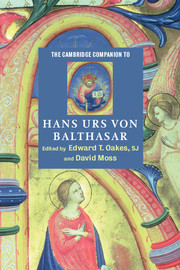Book contents
- Frontmatter
- 1 Introduction
- Part I Theological topics
- 2 Revelation
- 3 Christology
- 4 Balthasar and the Trinity
- 5 For the life of the world: Hans Urs von Balthasar on the Church as Eucharist
- 6 Balthasar and the figure of Mary
- 7 The saints
- 8 One sex or two? Balthasar’s theology of the sexes
- 9 Eschatology
- Part II The trilogy
- Part III Disciplines
- Part IV Contemporary encounters
- Select bibliography
- Index
5 - For the life of the world: Hans Urs von Balthasar on the Church as Eucharist
from Part I - Theological topics
Published online by Cambridge University Press: 28 May 2006
- Frontmatter
- 1 Introduction
- Part I Theological topics
- 2 Revelation
- 3 Christology
- 4 Balthasar and the Trinity
- 5 For the life of the world: Hans Urs von Balthasar on the Church as Eucharist
- 6 Balthasar and the figure of Mary
- 7 The saints
- 8 One sex or two? Balthasar’s theology of the sexes
- 9 Eschatology
- Part II The trilogy
- Part III Disciplines
- Part IV Contemporary encounters
- Select bibliography
- Index
Summary
In the solemnly promulgated teachings of the Second Vatican Council, the Church defines herself as 'an instrument for the redemption of all, sent forth into the whole world as the light of the world and the salt of the earth'. But the Church also defines herself as the 'sacrament [efficacious sign; embodied form] by which Christ's mission is extended to include the whole of man, body and soul, and through that totality the whole of nature created by God'. As the mystical body of Christ, the Church thus is the instrument for God's plan to gather 'all things' (Eph. 1:10) in Christ, as well as the eschatological form of redeemed creation. In other words, the Church is indeed a tool, but also (at least by anticipation) that for which the tool is used: she is paradoxically both means and end - however provisionally that end is to be understood. But even provisionally, she embodies the end above all in her celebration of the Eucharist. For in the gift of the Eucharist, Christ endows the Church with the 'real presence' of his body and blood together with an inner participation in his mission to the world. If the mission of the Son is to redeem creation by means of an exchange (admirabile commercium) in which he offers himself eucharistically to the world and receives the world as gift from the Father, then the Church is called to enter into Christ's life and mission by eucharistically receiving creation in its entirety as a gift that mediates and expresses the triune life - thereby confirming and fulfilling God's original plan for the world.
- Type
- Chapter
- Information
- The Cambridge Companion to Hans Urs von Balthasar , pp. 51 - 63Publisher: Cambridge University PressPrint publication year: 2004
- 2
- Cited by



